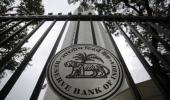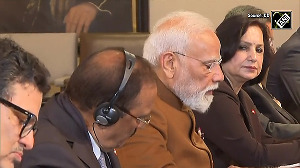NBFCs are mainly dependent on funding their operation from their own cash flows.
Jash Kriplani and Anup Roy report.

The liquidity crunch at non-banking financial companies (NBFCs) is worsening, with the money raised by these firms through bond issuances in the domestic market falling to a seven-month low of Rs 880 crore/Rs 8.8 billion in May.
Banking system liquidity, though, remains in surplus -- the Reserve Bank of India absorbed Rs 87,553 crore/Rs 875.53 billion of excess liquidity from the banking system.
But that is not flowing into the NBFC segment, which is struggling to raise money through any avenue, including bank loans.
Months after the bond market freeze following the IL&FS crisis in September 2018, bond issuances by NBFCs had started showing signs of recovery.
According to Bloomberg data, the issuances had climbed to Rs 7,755 crore/Rs 77.55 billion by January, which was over four times the value in November.
The data didn't show any bond issuance by NBFCs in October.
Analysts say payment delays by Dewan Housing Finance Corporation (DHFL) could once again expose the contagion risks in the debt market.
'This (DHFL) default could also accentuate contagion risk in the financial sector (against the backdrop of IL&FS' default last year), leading to higher costs and the polarisation of funds to better-rated NBFCs -- those with liquid balance sheets will also be better off,' CLSA said in a recent note.
AAA-rated NBFCs are still doing okay in terms of fundraising from the bond market.
In some cases, the spread between equivalent maturity government bonds and AAA-rated bonds has contracted 15 to 20 basis points, according to Harihar Krishnamurthy, head of treasury at the First Rand Bank.
But that may not have extended to the entire NBFC segment, as investors remain circumspect.
"The present situation is both a sentiment issue as well as liquidity issue for investors, as mutual funds are getting lower inflows and have less funds to invest, and this has made them excessively cautious," says Shameek Ray, head of debt capital market at ICICI Securities Primary Dealership.
Ray admits the situation is not that dire for better-rated NBFCs that are "consistently raising funds from the bond market" while others depend mainly on bank funding.
A tougher environment for NBFCs can have ramifications for other segments of the economy, analysts point out.
'This can have a rub-off effect on sectors with a higher dependence on NBFCs (like real estate, housing, auto and small and medium enterprises),' the CLSA note added.
Moreover, experts warn that liquidity crunch has cast doubts on some of the NBFCs's ability to survive.

"Just selling down assets to pay immediate liabilities will not bring in any growth. Some NBFCs would need stronger management with fresh capital. Otherwise, some could find it difficult to exist," says a fund manager, requesting anonymity.
For now, NBFCs are mainly dependent on funding their operation from their own cash flows.
They are trying to securatise their portfolio and sell it to banks.
Banks have also widened their securitisation portfolio to accommodate NBFCs.
For example, State Bank of India raised its target for buying securitised loans from NBFCs to Rs 45,000 crore/Rs 450 billion from Rs 15,000 crore/Rs 150 billion.
Union Bank of India also doubled its target.
However, most of these are securitised retail loans.
In 2018-2019, NBFCs and housing finance companies securitised Rs 1.9 trillion of their retail loans, doubling from Rs 85,000 crore/Rs 850 billion a year ago, according to Crisil.
The sale of assets is actually bad for NBFCs in the long run.
While it ensures immediate survival, assets are the best quality that NBFCs hold.
Since companies are not extending much of a loan due to liquidity squeeze, they are not getting new business.
After the securitisation of good assets, the books could be left with duds, which are a future risk, points out an analyst.
Due to difficult conditions back home, some NBFCs are exploring the offshore markets.
'We expect NBFCs to become more regular issuers in the offshore bond market as they seek to diversify their funding sources. If prudently managed, this should be credit positive as funding profiles are strengthened,' Fitch Ratings said in a recent report.
Recently, a few large NBFCs, not necessarily AAA rated, collectively raised about $2 billion worth of bonds.
NBFCs, through their banks, promptly swapped the dollars for rupee.
The RBI's $10 billion swaps ensured that forward rates for three years crashed, and these NBFCs rushed in to cover their position.
The dollar loans were raised in sync with the RBI's dollar swap tenure of three years to take advantage of a cheaper forwards rate.
The forwards rates had crashed below 3.50% after the first such swap announcement in mid-March.
The one-year forwards rate has inched up again to 4.11% now, but it is still relatively cheap, considering one year forwards remains more or less at 5% to 5.5%.
The RBI is unlikely to repeat a dollar swap, but executives at NBFCs are expecting some kind of help from the central bank.
"The RBI should help us directly by swapping any loans that we raise abroad, something that was done for banks," says an official with an NBFC.
But market experts say that is unlikely to happen as any fundraising increases India's external debt and if any NBFC defaults, it will not be good for any Indian company planning to raise funds abroad, irrespective of the rating.
The present situation, however, could turn around soon and NBFCs can hope to get back their mutual fund investors.
"In a falling interest rate scenario, bank fixed deposit rates will go down and that will encourage investors to come back to mutual funds and markets," says Ray.
"So, the situation will hopefully get restored to normalcy in some time."
Illustration: Uttam Ghosh/Rediff.com










